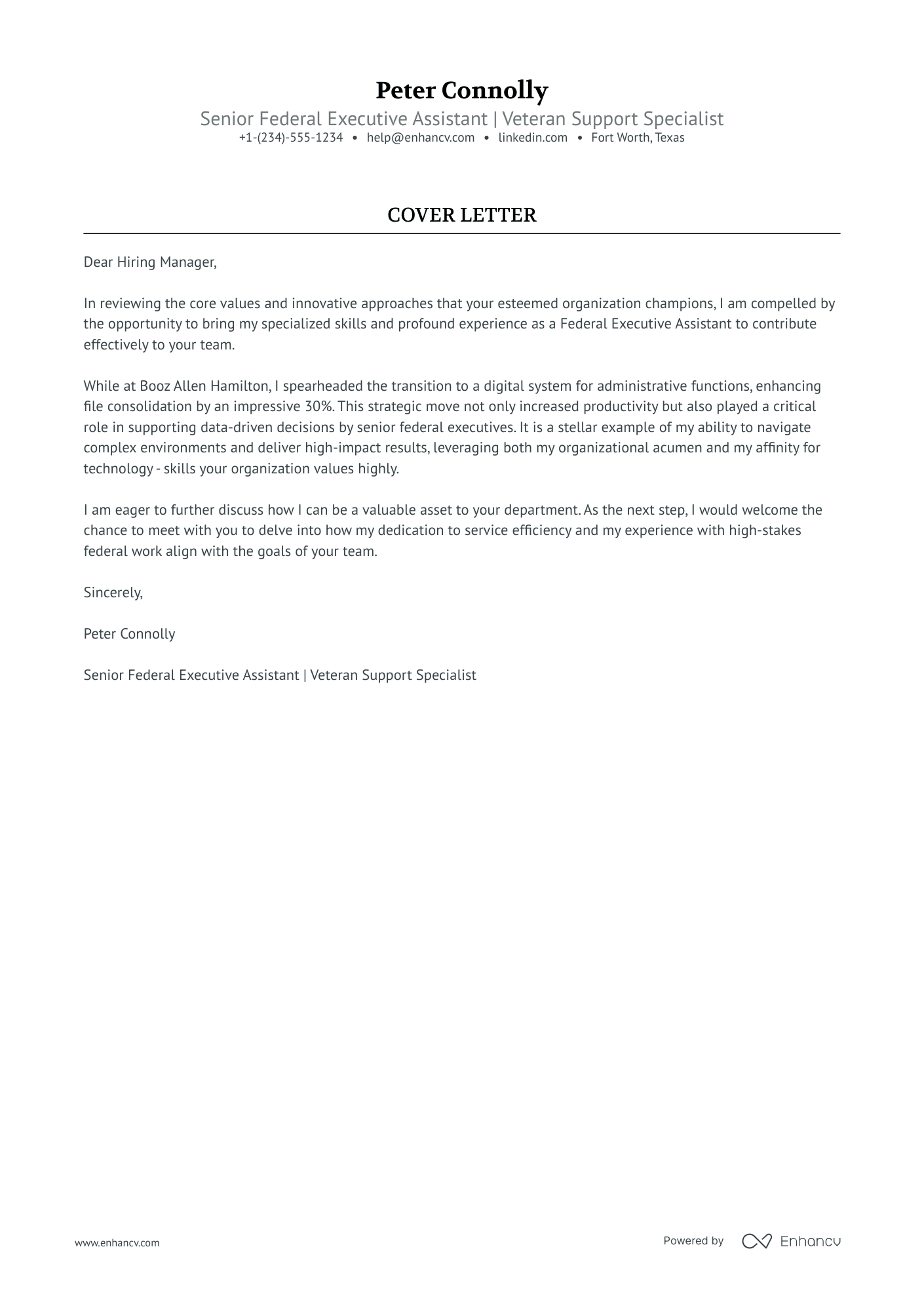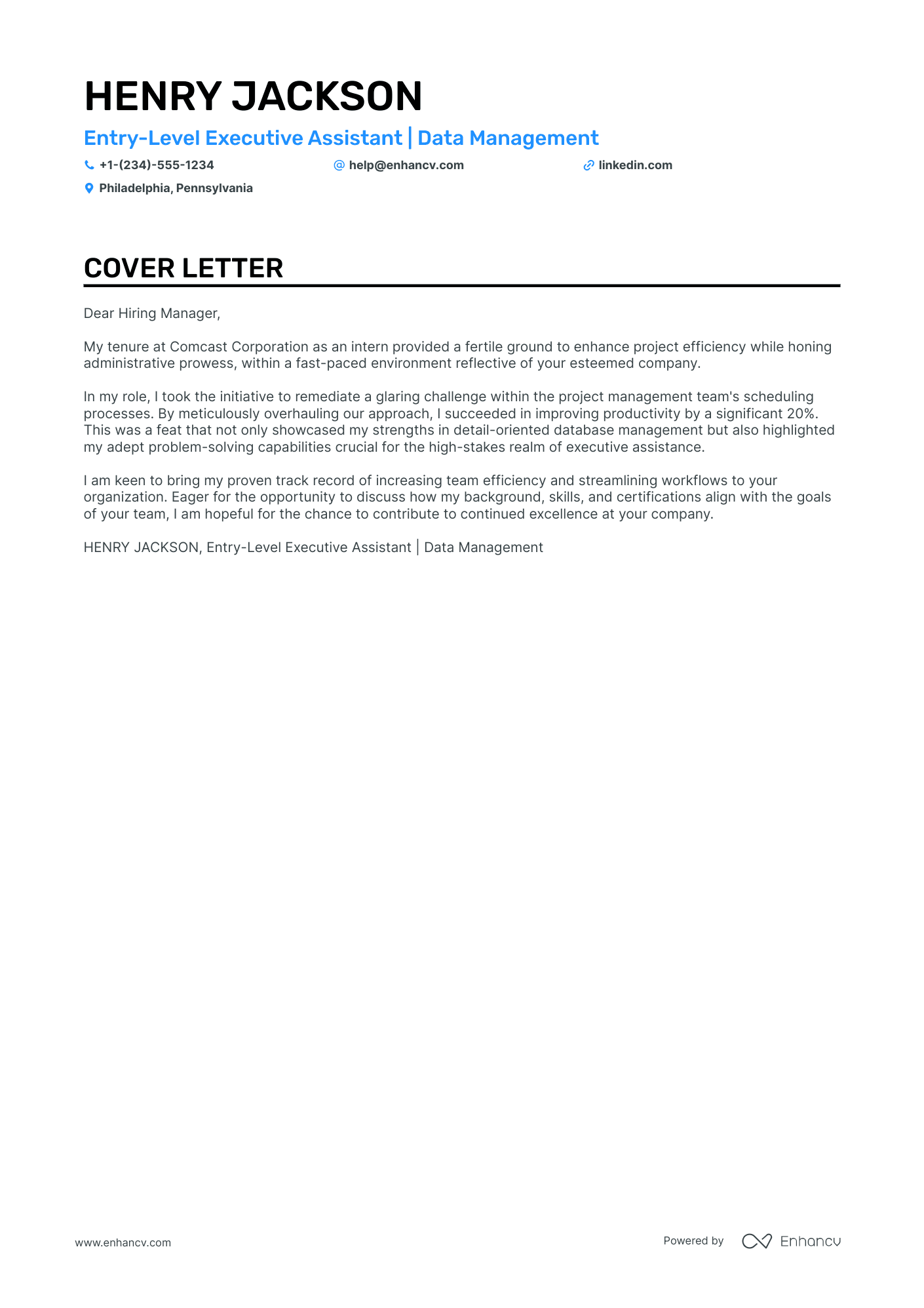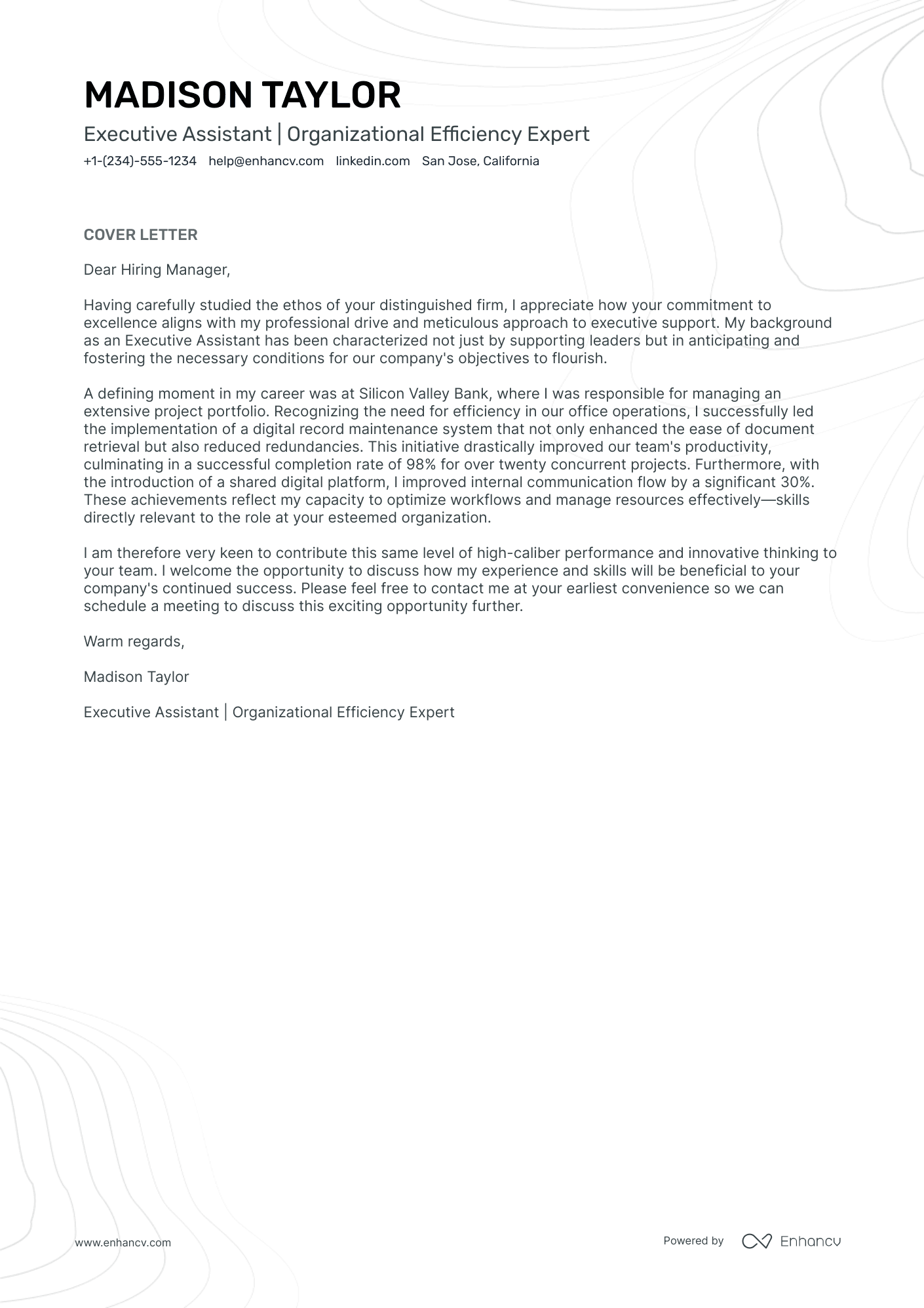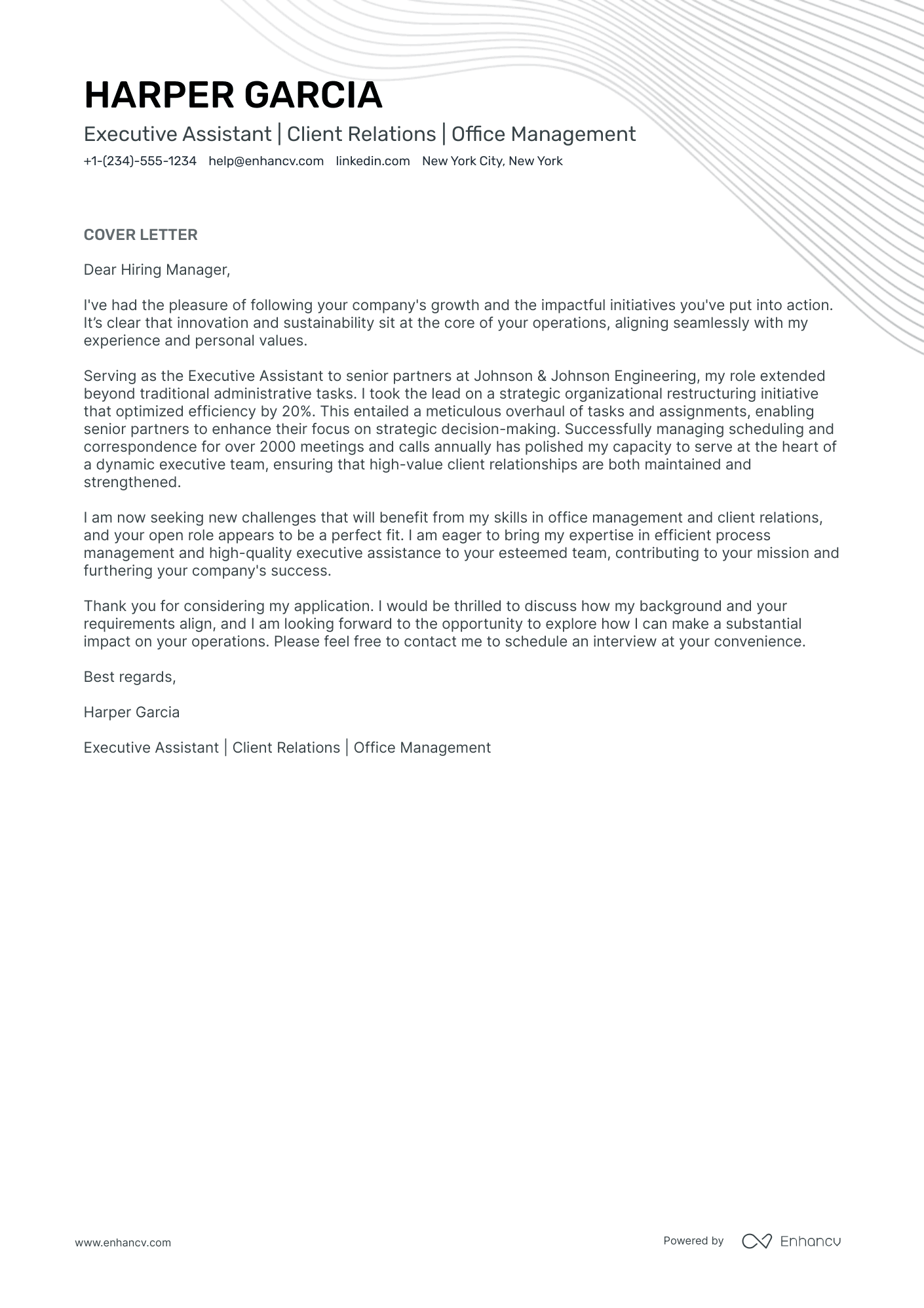Crafting an executive assistant cover letter can feel overwhelming—especially when you're eager to impress. You've polished your resume, started applying for your dream job, and suddenly you face the daunting task of summarizing your professional pride without sounding like a broken record. Your cover letter is your narrative, a chance to highlight your pinnacle achievement without the clichés, all while keeping it succinct and under one page. Let's begin shaping your story into a compelling and formal introduction that stands out.
- Step your best foot forward in the executive assistant cover letter introduction;
- Be inspired by other professionals' certified cover letters;
- Structure your executive assistant cover letter to feature what matters most;
- Close off your executive assistant cover letter to make a memorable impression on recruiters.
But where to start writing? Upload your resume into Enhancv's AI, which will prepare your executive assistant cover letter (all you need to do is personalize it, and you'll be good to go).
If the executive assistant isn't exactly the one you're looking for we have a plethora of cover letter examples for jobs like this one:
Drop your resume here or choose a file.
PDF & DOCX only. Max 2MB file size.
Executive assistant cover letter example
ANDREW CLARK
Mayfair, London
+1-(234)-555-1234
help@enhancv.com
- Quantifying Achievements: Mentioning specific accomplishments, such as managing a portfolio of over 650 customer accounts and overseeing loans valued at CAD 12 million, helps to provide concrete examples of the applicant's capabilities and past successes.
- Identifying Relevant Experience: The applicant outlines their direct experience in reducing turnover by 25% through streamlining hiring processes, directly relating to key responsibilities of an Executive Assistant in maintaining operational efficiency.
- Award Recognition: Highlighting the acquisition of industry-specific awards (7 American Advertising Pele Awards), the applicant showcases their contribution to substantial, recognized achievements and credibility in the market.
- Proactive Call to Action: The applicant invites the hiring manager to schedule an interview, showing eagerness and initiating the next step in the job application process, which can signal confidence and assertiveness to the employer.
What about your executive assistant cover letter format: organizing and structuring your information
Here is one secret you should know about your executive assistant cover letter assessment. The Applicant Tracker System (or ATS) won't analyze your cover letter.
You should thus focus on making an excellent impression on recruiters by writing consistent:
- Header
- Greeting
- Introduction
- Body paragraphs (and explanation)
- Promise or Call to action
- Signature (that's optional)
Now, let's talk about the design of your executive assistant cover letter.
Ensure all of your paragraphs are single-spaced and have a one-inch margins on all sides (like in our cover letter templates).
Also, our cover letter builder automatically takes care of the format and comes along with some of the most popular (and modern) fonts like Volkhov, Chivo, and Bitter.
Speaking of fonts, professionals advise you to keep your executive assistant cover letter and resume in the same typography and avoid the over-used Arial or Times New Roman.
When wondering whether you should submit your executive assistant cover letter in Doc or PDF, select the second, as PDF keeps all of your information and design consistent.
Tight on time? Our free cover letter generator helps you create a cover letter instantly from your resume.
The top sections on a executive assistant cover letter
- Header: This section includes your contact information and the date, ensuring the recruiter knows how to reach you and identifies the timeliness of your application.
- Greeting: Personalize this with the hiring manager's name, if possible, to demonstrate your attention to detail and personalized approach, which are critical skills for an executive assistant.
- Introduction: Briefly introduce yourself and state the position you are applying for, highlighting your immediate interest and enthusiasm for the role of an executive assistant.
- Body: Use this section to detail your relevant experience, skills in managing executive schedules, coordinating meetings, and handling confidential information, which are key responsibilities of an executive assistant.
- Closing: Conclude with a strong statement about your suitability for the position and a call to action, such as expressing your eagerness to discuss how you can contribute to the executive team in an interview.
Key qualities recruiters search for in a candidate’s cover letter
- Exceptional organizational skills: This is crucial for managing the executive's hectic schedule, coordinating meetings, and ensuring efficient time management.
- Superior communication abilities: Essential for acting as a liaison between the executive and other staff or external contacts, handling correspondence, and conveying information clearly and professionally.
- Discretion and confidentiality: Vital for handling sensitive information and maintaining the privacy of the executive's communications and records.
- Proactive problem-solving: An executive assistant must be able to anticipate challenges and address them promptly without always needing direction from the executive.
- Advanced proficiency with office technology: To be efficient in this role, a strong command of office software, communication tools, and possibly virtual assistant technology is important.
- Adaptability and flexibility: Given that the executive's needs can change rapidly, being able to adjust priorities and accommodate new tasks is key to the role of an executive assistant.
The executive assistant cover letter salutation: how to address hiring managers
After covering the format of your executive assistant cover letter, let's look at the salutation.
Back in the day, the cordial "To whom it may concern" or "Dear Sir/Madam", might have worked out fine.
But, nowadays, your cover letter should approach hiring managers on a more personal basis.
So, what to do about your cover letter salutation?
If you've messaged the recruiters and are on a first name basis or a more formal one, use the hiring manager's name in the greeting (e.g. "Dear Sophie," "Dear Ms. Givens", or "Dear Mr. Everett,").
Always aim to make the effort to find out the name of the hiring manager, who'd be assessing your application. Search on LinkedIn, double-check the advert on the corporate website, or message the brand on social media to find out more about the role.
If you can't find the hiring manager's name (and still want to sound professional), use "Dear HR Team,", "Dear Hiring Manager,", or the likes.
List of salutations you can use
- Dear Hiring Manager,
- Dear [Company Name] Team,
- Dear [Mr./Ms./Dr.] [Last Name],
- Dear [Job Title] Hiring Team,
- Dear [Department Name] Team,
First introductions in your executive assistant cover letter
Within your executive assistant cover letter introduction, genuinely state what you like about the organization.
Research the latest company projects, honorary awards, company updates, etc.
Write up to two sentences to let recruiters know what impresses you about the company,
This would help you to set a good tone for the rest of the communication.
What comes next: your executive assistant cover letter middle paragraphs
In the next three to six paragraphs (or the body of your executive assistant cover letter) you have to prove your unique value.
Most candidates tend to mess up at this stage. They tend to just copy-paste information from their resume.
That's one big no-no.
Remember that when writing your executive assistant cover letter, it has to be personalized. And, your ultimate aim is to catch the recruiter's eye.
So, look back on key job requirements and write down a list that includes the ones you cover.
Next, select just one key achievement from your professional (or personal) history that meets those advert keywords.
Narrate a story around how you've grown your skill set and knowledge. Also, aim to show the unique understanding or soft skills you bring about, thanks to your past success.
Finishing off your executive assistant cover letter with what matters most
So far, you've done a fantastic job in tailoring your executive assistant cover letter for the role and recruiter.
Your final opportunity to make a good impression is your closing paragraph.
And, no, a "Sincerely yours" just won't do, as it sounds too vague and impersonal.
End your executive assistant cover letter with the future in mind.
So, if you get this opportunity, what do you plan to achieve? Be as specific, as possible, of what value you'd bring to the organization.
You could also thank recruiters for their interest in your profile and prompt for follow-up actions (and organizing your first interview).
Lacking experience: here's how to write your executive assistant cover letter
As a candidate with no experience, it's important to be honest from the get-go of your application.
Use your executive assistant cover letter to sell your unique talents. Choose an accomplishment from your academic background or your volunteer work to show the skills that are relevant to the role.
Focus on your career objectives and how you see the job to align with them. Be specific and, at the same time, realistic about where you picture yourself in five years.
Key takeaways
Within this Enhancv guide, we've provided you with plenty of advice and inspiration on writing your executive assistant cover letter:
- Always make sure your executive assistant cover letter is tailored to the role you're applying for to make a good impression on recruiters;
- In your executive assistant cover letter include a header (with your name, the role you're applying for, date, and contact details) and an introduction of up to two sentences that highlight your key accomplishment or why you'd fit the role;
- Focus your executive assistant cover letter body on one sole achievement through your career and all the valuable lessons, skills, and know-how you've learned (that are relevant to the role);
- Ensure your executive assistant cover letter closing statement isn't generic and includes either a call to action or a promise;
- If you lack professional experience, shift recruiters' focus to a relevant achievement (thanks to your academic or versatile experience) or toward your dreams and goals for professional growth.
Executive Assistant cover letter examples
By Experience
Senior Executive Assistant
Entry-Level Executive Assistant
By Role













